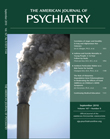Medication Guesses in Double-Blind Studies
To the EditorS: In their commentary published in the March 2010 issue of the Journal, Roy H. Perlis, M.D., M.Sc., et al. (1) should be commended for reminding us of the possible role that correct medication guesses may have in interpreting study results obtained with antidepressants in double-blind trials. Often in these days, when reading “new” kernels of wisdom, I experience a déjà vu phenomenon: Have I not seen similar data a long time ago? In fact, in the early 1960s, we published our first paper on doctor medication guesses (2). The results were based on data from several double-blind anti-anxiety studies. After 4 weeks of treatment, in these early days of psychopharmacology, we conducted primarily 4-week anxiety and depression trials; a total of 156/231 (68%) patients who were receiving active drugs were guessed to have been receiving an active drug, and 75/148 (51%) patients receiving placebo were guessed to have been receiving an active drug (χ2=11.93). Improvement played a big role in these ratings. At the same time period, 73% of improved but only 32.0% of unimproved patients were guessed to have been receiving active medication.
In our second study (3), we had data available from a 6-week anxiety trial. Adverse events became important modifiers, but only at 6 weeks, not earlier. Irrespective of the treatment received, physicians guessed significantly more often that patients with adverse events were receiving an active drug (N=20/22) relative to patients not reporting adverse events (N=68/116; χ2=7.01). After 6 weeks of treatment, medication guesses correlated with global improvement (r=0.65) and with adverse events (r=0.65). The multiple r between medication guesses and both global improvement and adverse events was 0.87. These data made us conclude that early improvement and, to a lesser extent, adverse events exert influence on physicians' medication guesses during a double-blind controlled study.
And while I agree with Perlis et al. that to include medication guesses into future study designs should be seriously considered, I do not believe that either the use of two raters or the use of active placebos are recommendations that would lead to improved trial methodology.
1. : Assuring that double-blind is blind. Am J Psychiatry 2010; 167:3Link, Google Scholar
2. : Doctor medication guesses: an indicator of clinical improvement in double-blind studies. J New Drugs 1965; 5:67–71Crossref, Medline, Google Scholar
3. : Is a double-blind clinical trial really double-blind? A report of doctors' medication guesses. Psychopharmacologia 1970; 16:329–336Crossref, Medline, Google Scholar



